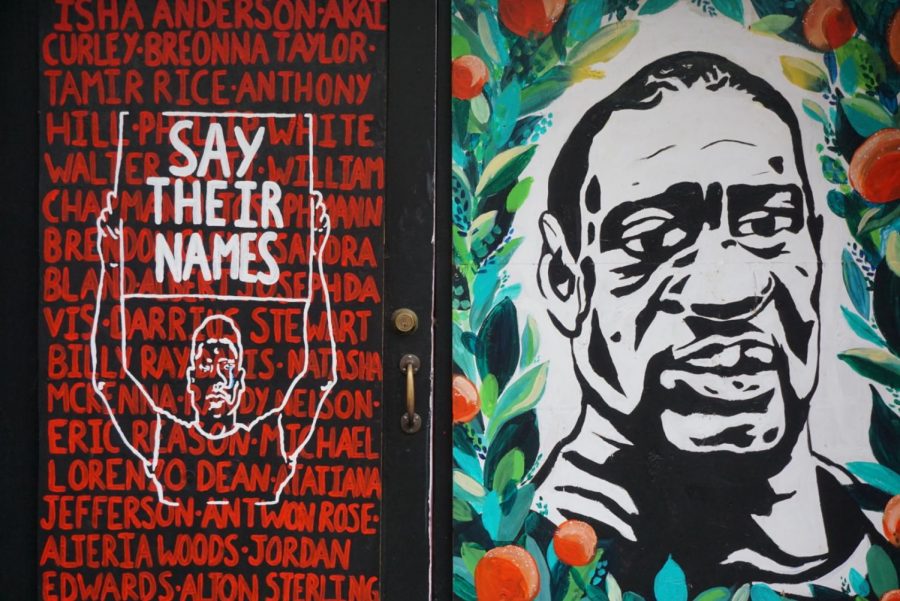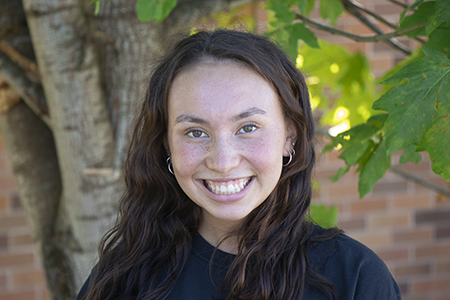For La Salle Students, Derek Chauvin Verdict Is Seen as a Step Closer to Justice
A mural of George Floyd’s face in downtown Portland, alongside the names of other Black Americans who died at the hands of police.
April 21, 2021
Sophomore Allie Ball was in her last class of the day when she heard that the jury in the trial of Derek Chauvin, the former police officer who killed George Floyd last May, had reached a verdict.
Ball was among many people across the country who waited in tense anticipation for the announcement of the verdict, which came about an hour after the news that a decision had been made. The jury reached a verdict after 10 hours of deliberation over two days following a three-week trial in Minneapolis.
After getting home from school, tuning in to live updates from Minneapolis on the radio during her commute, Ball flipped to CNN on the television with her younger brother, Shane.
When the verdict was read in a live broadcast from the courthouse, finding Chauvin guilty of all three of the charges he faced — second-degree murder, third-degree murder, and second-degree manslaughter — Ball said she was overcome with “a huge sense of relief.”
Ball and her brother exchanged hugs and high fives in celebration that Chauvin would be held accountable for the murder that spurred a nationwide reckoning over racial injustice and police brutality over the past eleven months.
This sort of outcome hasn’t often occurred in the past. The New York Times called the verdict “a rare rebuke of police misconduct” in light of the many past instances where law enforcement officers have been acquitted or not charged after killing Black citizens.
“It almost sounded and felt like a La Salle women’s state championship game in the room,” Ball said, recalling the moment when she and her brother learned of the verdict. “It meant so much to the both of us… I protested in the summer and I spoke at rallies, and my brother was there for some of those. And it was just a huge moment because it felt like that fighting that we did this entire past year, it was won.”
With yesterday’s verdict, many people feel that justice for Floyd — a central focus of the past year’s Black Lives Matter protests — is delivered. But Ball, along with many other activists and proponents of racial justice, feels that Chauvin’s conviction is just one step towards comprehensive justice, while certainly a positive progression.
“I don’t think this is necessarily justice yet — I think it’s the beginning of more accountability,” senior Paige Martin said. “We have a long ways to go before that. It’s a step in the right direction, but one conviction doesn’t make up for those who haven’t been convicted yet. And if this hadn’t reached national headlines, I have to wonder if the verdict would have even been the same.”
The widely-circulated video captured by then-17-year-old witness Darnella Frazier, showing Chauvin pressing his knee into Floyd’s neck for more than nine minutes, ignited a fire that burned in the hearts of many Americans, launching millions of protesters into the streets to demand not only justice, but also police reform, in what could be the largest social movement in U.S. history.
Without such resonant and persistent demands for justice, Martin said she isn’t sure that the trial would have reached the outcome that it did.
“I honestly believe that the verdict would not have been the same if it hadn’t reached national headlines, if those people hadn’t recorded anything, and if the protests hadn’t started over the summer and everything like that,” Martin said. “I honestly don’t think if especially our generation hadn’t made such a big showing about this… to actually try and make change, I don’t think this would have followed through.”
Senior Michael Bright said he feels that the jury’s decision could have been influenced by the mass protests and race-related dialogue that engulfed the nation after Floyd’s death last year.
“I feel like there was a lot of pressure on the jury,” Bright said. “If… [Chauvin] was acquitted, they would have been doxxed… I’m not going to necessarily say they were forced to find him guilty, but if they didn’t find him guilty, then all hell would have broken loose.”
Still, Bright said he feels that the jury’s verdict is just.
“I think it’s good justice,” Bright said. “I was completely expecting him to be found guilty, and I think he should have been found guilty… No doubt about it. I think it just shows that we’re taking the right steps into justice.”
Like Bright, junior Natalie Fuchs said she feels that the attention this case received could display a greater commitment to justice from the public.
“I hope this verdict means our country is taking strides to be more just and to hold people accountable for their actions,” Fuchs said.
Martin believes that the protests over the past year impacted the trial, and that masses of people raising their voices in a collective push for justice seemed to be effective in achieving it. But, she also noted the significance of the fact that it seemingly took millions of people demanding change in order for Chauvin to be held accountable.
“The fact that we have to hope that our justice system will actually do us justice shows that there are still very deeply rooted problems that need to be addressed,” Martin said. “In my opinion, a real victory would have been if George Floyd was still alive today. So there’s still a lot of work to be done to get to that point.”
Junior Ella Gach expressed similar thoughts, recalling how she felt as she was waiting for the verdict to be announced as she sat on the couch with her grandmother, eyes and ears directed at the television.
“The whole time we were waiting… we were nervous,” Gach said. “The fact that we were even nervous, like on the edge of our seat… I just think it’s sad that we can’t trust our justice system enough to say [that] we’re confident that they were going to get up there and say that he was guilty on all three charges.”
Still, Gach said that Chauvin’s conviction is a positive step toward justice, and that “this is all going to go down in history.”
“People finally realized the power that they hold — the power of their voice, the power that they have,” Gach said. “I think [Chauvin] getting charged guilty on all three charges, that was definitely like we could finally [take] a sigh of relief. Because we did push and push for a year — it’s almost been a year since [Floyd’s] death — so it’s definitely a sigh of relief that we didn’t do everything for nothing, they actually heard us, they’ve seen us.”
Gach emphasized that despite this relief, there is further work to be done.
“We are finally seeing some type of accountability being taken,” she said. “But at the same time, justice isn’t completely served until we see zero killings by police officers against unarmed, innocent, black and brown individuals.”
“I’ve seen a lot of people on social media talking about, oh my gosh, justice is served,” Gach continued. “But I think they fail to realize that justice is served if police officers aren’t still killing innocent people… This isn’t exactly justice, I think this is more like accountability.”
Sophomore Harris Nguyen also felt that “the verdict was just the beginning for our country,” he said. “There are many more injustices out there and we will continue to fight for those who have not had their justice they deserve and their voices heard.”
For Nguyen, recent deaths of Black Americans at the hands of police revealed the prevalence of systemic racism in the U.S.
“Growing up and seeing countless deaths of Black people showed me police brutality and racism still play a huge role in our country,” he said.
Gach expressed that Floyd’s death at the hands of police last May was by no means an isolated incident, and the conviction of Chauvin this week, she said, doesn’t change how often police killings occur.
“Just because Derek had his trial and he got charged, that doesn’t mean everything’s over,” Gach said. “We still have to remember to continue to fight, bring awareness, educate others, educate ourselves and each other, and just continue to fight for justice and equality of all people.”
Ball, who enjoyed a moment of celebration upon the announcement of the verdict, and who, like Gach, described a feeling of finally being able to “take a deep breath” after months of advocating for justice, echoed Gach’s call to continue to address systemic racism, and to seek justice for the lives that have been taken because of it.
“It’s just so important that we don’t stop the fight,” Ball said. “Because there are so many more fights that need to be won, so many more people who haven’t been served justice, and we’ll continue to demand it.”






